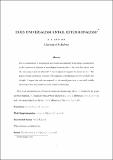Files in this item
Does universalism entail extensionalism?
Item metadata
| dc.contributor.author | Cotnoir, Aaron | |
| dc.date.accessioned | 2016-03-16T00:00:46Z | |
| dc.date.available | 2016-03-16T00:00:46Z | |
| dc.date.issued | 2016-03 | |
| dc.identifier | 166204638 | |
| dc.identifier | 8959d931-f084-4415-8dac-a6a4d0f0430d | |
| dc.identifier | 000368807300006 | |
| dc.identifier | 000368807300006 | |
| dc.identifier | 84956792527 | |
| dc.identifier.citation | Cotnoir , A 2016 , ' Does universalism entail extensionalism? ' , Noûs , vol. 50 , no. 1 , pp. 121-132 . https://doi.org/10.1111/nous.12063 | en |
| dc.identifier.issn | 0029-4624 | |
| dc.identifier.other | ORCID: /0000-0003-4528-7570/work/65702586 | |
| dc.identifier.uri | https://hdl.handle.net/10023/8420 | |
| dc.description.abstract | Does a commitment to mereological universalism automatically bring along a commitment to the controversial doctrine of mereological extensionalism—the view that objects with the same proper parts are identical? A recent argument suggests the answer is ‘yes’. This paper attempts a systematic response to the argument, considering nearly every available line of reply. It argues that only one approach—the mutual parts view—can yield a viable mereology where universalism does not entail extensionalism. | |
| dc.format.extent | 12 | |
| dc.format.extent | 110977 | |
| dc.language.iso | eng | |
| dc.relation.ispartof | Noûs | en |
| dc.subject | B Philosophy (General) | en |
| dc.subject | BC Logic | en |
| dc.subject | BDC | en |
| dc.subject | R2C | en |
| dc.subject.lcc | B1 | en |
| dc.subject.lcc | BC | en |
| dc.title | Does universalism entail extensionalism? | en |
| dc.type | Journal article | en |
| dc.contributor.institution | University of St Andrews. Philosophy | en |
| dc.identifier.doi | https://doi.org/10.1111/nous.12063 | |
| dc.description.status | Peer reviewed | en |
| dc.date.embargoedUntil | 2016-03-16 |
This item appears in the following Collection(s)
Items in the St Andrews Research Repository are protected by copyright, with all rights reserved, unless otherwise indicated.

